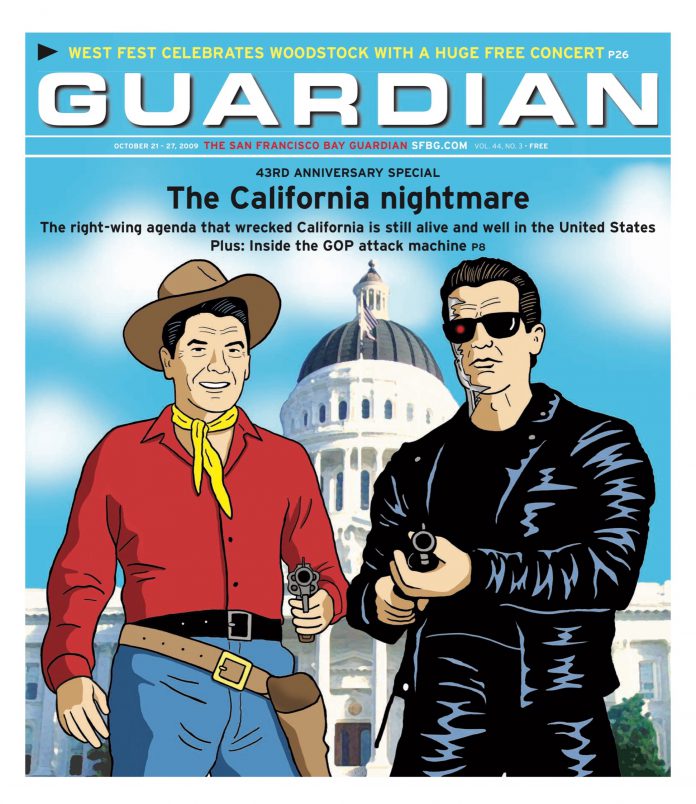arts@sfbg.com
MUSIC "Esinchill is one of the most … " Mistah F.A.B. pauses to reconsider. "No, Esinchill is the most underrated rapper in the Bay."
I agree, and "underrated" in this case means "underknown," because, once heard, Esinchill’s talents are undeniable. His is a lyrical wit based more on word choice ("I go from extremely docile to routinely hostile") than punchlines. With a million flows at his disposal, he’s equally able to freestyle or compose. Esinchill himself thematizes this: "Once you play me, then you like me, then you love me, and it’s ugly from there," he raps over the guitar-driven K-MAXX production "I Dare You," which opens Vigilante, his second solo album, released digitally (with CDs to follow) by Jake Records. Put him on a track with more famous rappers and, as F.A.B. says, "He overshines them all."
So why isn’t Esinchill better known? Partly because his career path has been atypical. The man born Erick Campbell started out with Digital Underground. He spent five years touring with DU, playing more than 200 nights a year, with crowds ranging from a couple hundred to 60,000. He even appears with DU on DJ Quik’s classic Balance & Options (Arista, 2000). Few Bay rappers can boast these types of credentials. Yet after two local releases — his solo debut Everything to Lose! (Rceason, 2002) and a duo disc with King Beef, Choice Cuts (Rceason, 2005) — Esinchill remains East Oakland’s best-kept secret.
"People don’t know how to market me," Esinchill says by phone from Atlanta, where’s he’s writing R&B and rock songs for Outkast’s Dungeon Family. Songwriting is Esinchill’s latest industry endeavor; in 2007, he even penned a Top 20 adult contemporary hit "Tuesday" for former Tower of Power singer Lenny Williams. His remark refers to the difficulty of landing a deal, but it also summarizes the second obstacle to his reputation: in the promiscuous world of Bay rap, where the primary way to build a buzz is through collaborations with well-known artists, the hard-to-categorize Esinchill remains aloof. He comes from the same East Oakland streets as gangsta rappers like Keak Da Sneak or Beeda Weeda, but he doesn’t rap about gangsta topics.
"If an artist chooses to rap about those kinds of things, selling dope, killing people, and robbing, it boxes you in," Esinchill says. "I would say the majority of the cats who rap like that don’t live that lifestyle. But I wouldn’t talk about nothing unless I’m doing it or seen it."
On the other hand, Esinchill’s not a backpack rapper. While there’s an undeniable political dimension to his work, it invokes direct emotional response. On "Where’s the Justice?" — the most overt number on the album, invoking the Black Panthers’ "Off the Pigs" — Esinchill tells of a DUI he got "when he wasn’t drivin’," shouting "I was a passenger! I was a passenger!" Anyone who has dealt with the arbitrary injustice of the police can identify, even as he emphasizes that whites don’t realize the extent of what African Americans endure regularly.
Such stranger-than-fiction personal anecdotes underscore what makes Esinchill compelling. Only on "All the Way Live," a parodic pimp song produced by Jake-One, does E assume a character. Otherwise he raps as himself, displaying an entire, idiosyncratic personality rather than the one-dimensional gangsta persona common even among great rappers. His lyrics retain their comic flair, but his subject matter is mostly serious, even somber.
"Growth is essential," Esinchill says, inadvertently punning on his name. "I’ve matured as a person, but also as an artist. And with song topics as well. Of course, I got the miscellaneous shit. But I also got thought-provoking songs and conceptual songs."
Such songs range include "Daddy Was a Sailorman," in which he travels through time to meet his 18-year-old father; "I Feel U," where he expresses his angst about a compendium of social evils; and "The ’70s," an homage to one of the characterful decades of the 20th century, featuring vocals by Latoya London — star of American Idol and the stage musical version of Color Purple — for whom E also has been writing songs. Aside from a few vocalists like London, David Hollister, and the Bay’s premier hookstress, Naté, collaborators are scarce, limited to the few locals who can vibe with Esinchill, like Casual from Hieorglyphics, and FAB himself. Otherwise E goes it alone, and the result is a true album. Apart from the Jacka’s long-awaited triumph Tear Gas (Artist Records/SMC), Vigilante has no competition among Bay releases this year.
"My goal is to put out hot shit and not fold under pressure to veer into the normal lane," Esinchill concludes. "At my core, I’m just different. I’m incapable of being normal, as far as music goes. I gotta stay to the left — that’s just me."

